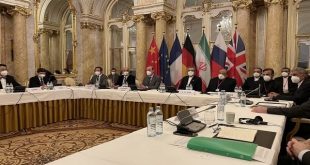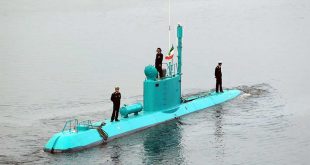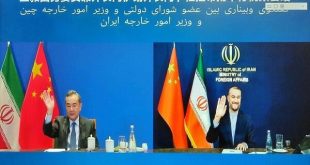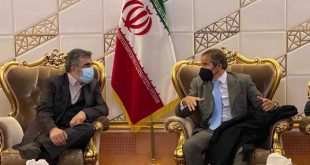“If the EU imagines that it can take the ways envisaged in the nuclear deal on the breach of the nuclear deal against Iran, it is making a big mistake,” Zarif said in a joint press conference with his Russian counterpart Sergey Lavrov in Moscow on Monday.
He added that Europe should first use the mechanisms against the US violation of the nuclear deal and then against itself after its defiance of its undertakings under the agreement, noting that then there will be no need to use those mechanisms against Iran because the country will restore a full implementation of the nuclear deal if envisaged mechanisms are taken against the violations of the US and Europe.
“It is a point that we and Russia are in consensus over and cooperate on,” Zarif said.
He described the nuclear deal as an important achievement of the international community, and advised that the European states would be better off “if they comply with their undertakings instead of attempts to annihilate the nuclear deal”.
European countries since last month have begun raising the possibility of triggering the JCPOA’s “dispute resolution mechanism,” which is also known as the trigger mechanism, and whose activation can lead to the return of the UN sanctions on Iran.
Recent threats to activate the trigger mechanism envisaged in the JCPOA were brought up after the Iranian government took a series of steps in reducing its commitments under the deal in response to the US measures and the Europeans’ failure to keep their end of the bargain in protecting Iran’s economic benefits in the agreement.
Iran has so far rowed back on its nuclear commitments four times in compliance with Articles 26 and 36 of the JCPOA, but stressed that its retaliatory measures will be reversible as soon as the European signatories — France, Britain and Germany — find practical ways to shield mutual trade from the US sanctions.
Head of the Atomic Energy Agency of Iran (AEOI) Ali Akbar Salehi warned the European signatories to the landmark 2015 nuclear deal, officially known as the Joint Comprehensive Plan of Action (JCPOA), that security repercussions of activating the “trigger mechanism” will serve nobody’s interests.
In a press conference on the sidelines of a ceremony last Monday, held to launch the second circuit of Iran’s Arak heavy water reactor, which is located near the central Iranian city of Khondab, Salehi said that if the European signatories to the JCPOA, activate the “trigger mechanism” to mount pressure on Iran, it will mean the demise of the deal.
Under the nuclear deal, signed between Iran and the P5+1 countries (the United States, Britain, France, China, Russia and Germany), Tehran agreed to remove the core of the Arak reactor and fill it with concrete provided that the other parties to the accord redesign it for the production of medical isotopes, which they did not.
The reactor consists of two circuits, with the first one tasked with removing heat from the heart of the reactor, and the secondary circuit responsible for transferring heat from the first circuit to cooling towers and finally to the outside environment.
“Europe wants the JCPOA to survive. The JCPOA is of security importance to them, but whether this demand is commensurate with their ability (to resist US pressures) is a different issue. The ability of Europe depends on its resistance against the United States, but unfortunately they have proven that the 28 (member) states (of the European Union) are less resistant and independent than a single (US) state like California,” Iran’s nuclear chief said.
Salehi added that if European countries seek to activate the trigger mechanism, it would be against their will, adding, “If the trigger mechanism is activated, nothing will be left of the JCPOA. This is a contradiction in the Europeans’ discourse.”
Expressing the hope that Europe would amend this discourse, Salehi said, “We hope that this European discourse is rectified, because this discourse will put Europe on the same level with an untrustworthy America.”
“Europe’s prestige has been tarnished before the world’s public opinion and they must not do more damage to this prestige. All parties must try to help the JCPOA survive,” Iran’s nuclear chief said.
Elsewhere in his interview, Salehi said that a possible reporting of Iran’s nuclear case to the United Nations Security Council would not serve the interests of anyone, warning that in that case, regional and international relations would change, leading to unpredictable repercussions.
He added that if the three European parties to the JCPOA fail to fulfill their obligations under the deal, Iran will make a proportionate decision, but “we hope that the opposite side will make a decision and carry out a measure that will prevent further complication of the issue.”
The Iranian nuclear chief noted that it is still too early to talk about Tehran’s fifth step in scaling back its commitments under the JCPOA if the European signatories did not take practical measures to salvage it.
Iranian President Hassan Rouhani is in charge of announcing the country’s steps to reduce its JCPOA commitments, but he has made no serious remarks in this regard yet, he said, adding that the president would make the necessary decisions and order the AEOI to implement them in due time.
He said Iran may accelerate certain measures or increase production.
 WILAYAH NEWS VOICE OF THE GLOBAL AWAKENING
WILAYAH NEWS VOICE OF THE GLOBAL AWAKENING






